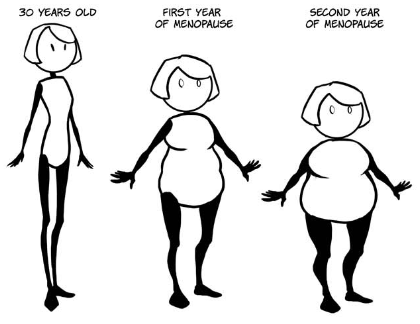Best way to lose weight during Menopause.
Best way to lose weight during Menopause.
Menopause-
a transitional stage for a women which is diagnosed after 12 months of
irregular or missed periods due to the discontinuation of ovarian hormones
activity. The current median age range of menopause is 45-55 years. This
shifting phase brings a lot of difficulties for women which includes vaginal
dryness, sleep difficulties, mood swings, osteoporosis and several other
malignancies. But one of the most significant and alarming aspect of menopausal
transition is weight gain. In this blog we will discuss what causes this weight
gain and ways to overcome it.
What causes weight gain during menopause?
Age,
hormone imbalance, and social and behavioral variables, such as decreased
physical activity and less attention to a healthy and balanced diet, all
contributes to menopause weight gain. Besides these, the gush of negative
emotions during this changeover such as depression, anxiety, tension leads to
emotional eating which causes weight gain. And if we talk about the hormonal
imbalance so hormone estrogen is very much related to hunger according to many
researches. Since the hormone estrogen inhibits the sense of hunger acting on
estrogen receptors alpha receptors of the pituitary hypothalamus circuit, so
the drop in estrogen level during menopause causes an increase in the
orexigenic signals and increases the calorie intake of the person, which if
followed by no physical activity or reduced energy expenditure can lead to
unfavorable energy balance. Lean mass loss and an increase in body fat are
two factors that contribute to weight gain. Adipose tissue is normally distributed
in an android pattern around the abdomen. This hormonal modifications occurring
during meanopause inclines to metabolic disorders which leads to chronic
diseases e.g osteoporosis, cardiovascular diseases, type-2 diabetes etc.
These
conditions can only be prevented by a lifestyle intervention by increasing
physical activity and healthy balanced diet.
Best eating plan for menopause- the Mediterranean diet
The
Mediterranean diet (MD) is said to be a promising nutritional pattern to be
followed in menopause due to its healthy properties. According to a research
the Mediterranean diet helps to reduce the risk of vasomotor menopausal
symptoms (hot flushes and night sweats). But first what is MD? The Mediterranean Diet is a
way of eating that emphasizes plant-based foods for menopause
weight loss and healthy fats. Nutritionist or
dietitians can help to get you know your body composition according to which
you can start mediterranen diet.
The Mediterranean foods to be included in
the plan are: extra virgin olive oil (cold pressed), whole grains, vegetables, fruits,
legumes, nuts, moderate consumption of fish and dairy products, and low intake
of red meat, eggs and sweets. Beverages and foods with added sugars should be
limited.
According to your total calorie intake your macronutrient intake should be distributed this way:
|
Main components |
Units |
|
Carbohydrates |
50-60% of total energy |
|
Fiber |
25g/day |
|
Protein |
15-16% of total energy |
|
Lipids cholesterol |
30%
of total energy <300 |
|
calcium |
1000mg |
|
Vitamin D |
600/800
UI |
|
iron |
18mg |
 |
| Mediterranean Food |
Nutritional recommendations
As age increases calorie intake decreases therefore menopausal women should restrict total energy intake.
·
For weight loss 500- 750 kcal/day
calorie should be decreased from estimated total calorie intake. [ e.g
2000-500= 1500kcal/day should be consumed for weight loss]+ the physical
activity.
·
For maintenance of muscle mass and
strength protein should be divided evenly into 3 meals as it increases muscle
mass by 25%.
·
Fiber intake should be increased.
·
Increase fruit veggies consumption
and avoid high glycemic index foods.
· Planning a menu consisting of 3 main meals (breakfast, lunch and dinner)and 2 snacks (mid-morning and mid-afternoon). The meals should be limited portion size, balanced meals, healthy snacking, and control over emotional eating episodes.
Physical activity in menopause
Physical activity has various advantages during the menopause transition and after the menopause. According to the Centre for Disease Control and Prevention, regular exercise helps relieve stress, enhances overall quality of life, and reduces weight gain and muscle loss, the most frequent side effects of menopause. Exercise intervention programmes have been shown to lessen menopause symptoms, such as vasomotor and sexual symptoms as well as somatic, psychological, and to a lesser extent, somatic problems. However, physically active women during and after menopause are less stressed and have greater overall quality of life. Exercise has been proven to alleviate menopausal symptoms. Overall, the data points to exercise as an effective intervention option for women experiencing menopause and postmenopause to reduce symptoms without experiencing any negative side effects.It is recommended that at least 150 min of aerobic activity and 75 min of vigorous activity to be undertaken per week. The woman’s ability to choose their preferred physical activity increases the likelihood that they will adhere to exercise as a treatment method.



Comments
Post a Comment